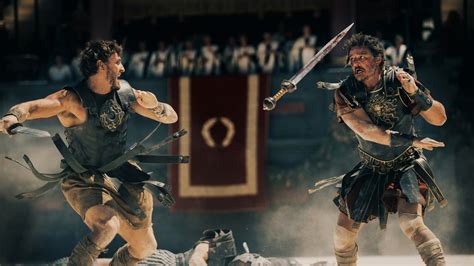As Ridley Scott’s career grows, he cares less about conventions and expectations. For him, only the stories and the excitement they stir in his audience truly matter. We’re lucky he has the courage to pursue this. Gladiator (not Gladiator II), released in 2000, was a relatively somber and serious epic, reigniting interest in classical epics. It brought history to life with a fierce energy.
Gladiator II is similarly grand in scale and spectacle, rich with metaphors. However, it’s also filmed with a quirky, absurd flair that has defined Scott’s work over the last fifteen years, from Alien: Covenant to Napoleon. At times, Gladiator II even embraces camp. To insist it shouldn’t is to hold 21st-century blockbusters to unnecessarily rigid standards.
Casting for Gladiator II:
Consider Peter Ustinov as Emperor Nero relaxing in silk and velvet in Quo Vadis (1951) or Claudette Colbert’s well-known milk bath in The Sign of the Cross (1932) as examples of how the movie combines a contemporary style with a tribute to the opulent past of the genre. Scott has even brought sharks to the Colosseum this time.
One central character is Lucius Verus (Paul Mescal), son of Lucilla (Connie Nielsen) and nephew to the late hero Maximus Decimus Meridius (played by Russell Crowe). As the grandson of Emperor Marcus Aurelius, Lucius is the rightful heir to the Roman Empire but was exiled as a child to protect him from assassins. Instead, the throne is claimed by the feuding co-emperors, brothers Geta (Joseph Quinn) and Caracalla (Fred Hechinger), with all the petulance and notoriety of Joaquin Phoenix’s Commodus.
The One about to face them is Denzel Washington as Macrinus, the former slave who has amassed good amount of wealth and has taken quite an interest in gladiatorial games. Macrinus seeks out Lucius, now captured and enslaved—the film’s laziest device, as repeating the previous setup feels contrived. While on the other hand, There is Lucius who wants to get revenge on the man who attacked his home city, General Marcus Acacius (The character with conflicted nobility and tenderness, Pedro Pascal). Macrinus is content to use Lucius as a pawn in his plans.
Washington brings pure, delicious entertainment to his dialogue. Despite weaknesses in David Scarpa’s screenplay, Washington treats the lines like Shakespeare, finding a rhythm as if in iambic pentameter where none exists. He delivers each line like a symphony, savoring its power like fine wine, all while adding flair through his costumes, designed by Janty Yates and David Crossman.
Meanwhile, Mescal plays Lucius as a man who’s never had a good night’s sleep—he’s angry, rough around the edges, yet moved by poetry (he’s a fan of Virgil’s Aeneid). He’s not the immediate, charismatic star Crowe was, but Mescal carries the film’s legacy and the weight of history admirably. Harry Gregson-Williams’s score does the same, frequently referencing Hans Zimmer’s original themes but delivering its own heroic moments.

Scott enjoys utilizing the past as a metaphor and is renowned for not caring about historical truth. This Rome is covered with a collective history of Christianized Western ideas rather than being an accurate depiction of the Roman Empire. Scott questions the centuries-long use of the alleged splendor of the classical world as a weapon. In this instance, Macrinus stands in for the outsider who enters the inner circle only to continue using violence in order to gain control. It’s a strong, timeless message.
But this is still Scott, so he has no hesitation in placing these themes side by side with outlandish visuals—think CGI baboons or Mescal bare-knuckle boxing. A naval battle in the Colosseum (a historical practice, minus the sharks) is filmed from the prow of one boat as it collides with another, while Quinn and Hechinger stand watching, foaming at the mouth, embodying all the manic energy of tyrannical emperors. In short, Gladiator II goes to show us how cinema should be made.